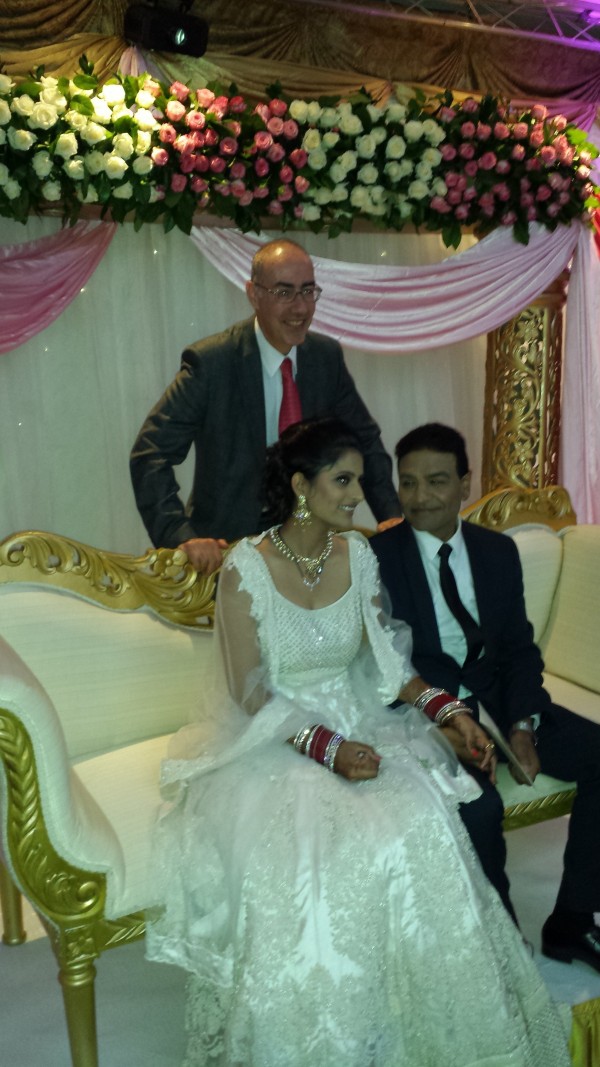
by Michael | Sep 8, 2015 | Blog
Misunderstandings can be quite damaging. My job as civil ceremony creator and conductor is certainly open to misconceptions.
I was vividly reminded of this a few days ago.
The wrong message
At a recent wedding fair, I had thought that I was getting through to people as I explained to them what a civil celebrant did and what a difference someone like me could make at a major lifetime event.
Then, three consecutive couples who were looking for a civil ceremony said to me, “Oh no, we can’t use you because we’ve already booked registrars.”
Unfortunately, they had missed the point entirely.
The registrars do the legal bit. They ensure you get the piece of paper that makes your marriage legitimate. The service that accompanies the certificate signing does not have to be the be all and end all of the occasion, although you can settle for that, if you wish.
To give your event an individual stamp, afterwards, you can have an add-on ceremony that actually means something to you and your guests; one that will create memories that last the rest of your life – both for you and for your guests.
The process
When planning the ceremony, a good civil celebrant will consult with, and listen to, you, so as to understand exactly what you may want. He will advise and guide you, as well as offer ideas, if you need any.
Then the celebrant will compile a draft and e-mail it to you. You will be invited to check it carefully, not just for any errors but also in case any of the readings (say) don’t work for you. Following your suggestions, the celebrant will make the relevant changes, and, after a couple more e-mail exchanges, you may virtually be there.
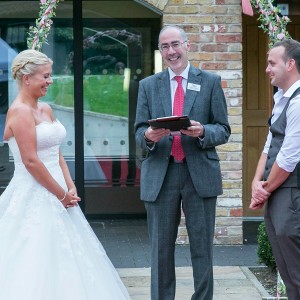
The ceremony, then, will reflect your personality, your beliefs and be everything you want it to be.
Every word will have been approved by you. Assuming that your celebrant has decent presentation skills, you will have a tailor-made, unique service that will be the ceremony of your dreams!
That’s something really wonderful.
And I think it was worth setting the record straight, don’t you?
by Michael | Aug 19, 2015 | Blog
Most people are familiar with the line that we have two ears but only one mouth because we ought to be listening twice as much as we speak.
Well, you might wonder how that applies in my job, as the popular image of a civil celebrant is that person standing up at the front, conducting the ceremony – be it a wedding, funeral, handfasting, blessing, naming or whatever – and jabbering away. In other words, I do the speaking and you (have to) do the listening!
However, there is another part of the proceedings that you probably wouldn’t think about, and that is when the ears/mouth equation comes into its own for me. That is during my planning meeting with the client.
After the initial contact, I almost always visit the next-of-kin, if it’s a funeral, or, if it’s a celebration, arrange a face-to-face or Skype meeting with the couple. As well as being an opportunity to see if we’re both OK to work together, this is a chance for the client to ask questions in an unintimidating atmosphere. For me, it is also an opportunity to ask questions and also to suggest ideas. (Yes, that does involve more talking!)
However, in reality, most of this conversation for me will be spent listening (although there is the occasional case – usually caused by shock after a death – when the client will say next to nothing, and I have to work at gaining their trust). I need to pay close attention, as I often have to pick up clues about what the client wants, as they may not really have much of a conscious idea themselves.
If the client does know exactly what they are looking for, my role is to take note so I can mould it in the best possible, most effective, way. I may question an element or two (“do you realise that …?”), but it’s not my job to change anything (provided everything’s legal, etc.).
I respect their wishes – they can have a mixture of religious elements (or none, if they choose) – and I try to accommodate any preferences they may have for readings, music and participants.
If they don’t know what they want, then I ask questions to get a sense for the sort of thing they may like and provide suggestions for possible rituals to fit the bill. When I finish, I try and put this all together to construct a meaningful and memorable ceremony that meets the needs – and beliefs – of the client. So maybe I do still sometimes talk a bit more than I listen, but I hope I’m getting the balance right.
Another way I’d love to put “two ears, one mouth” into practice is to respond to any requests you may have for subjects for me to deal with in my blogs. To quote my hero, Frasier Crane, “I’m listening!”
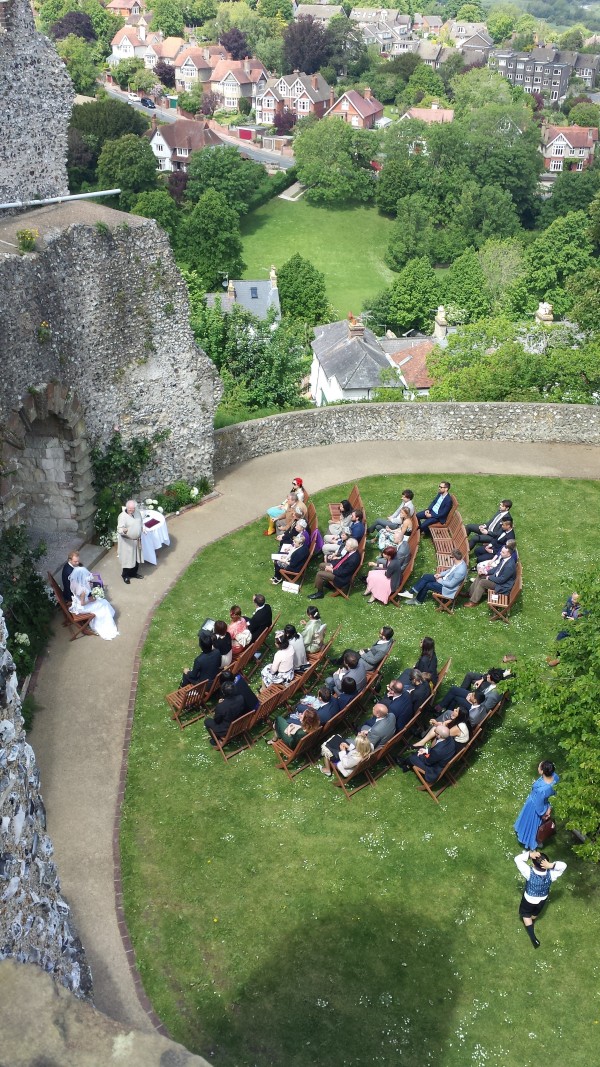
by Michael | Aug 11, 2015 | Blog
Where to have your wedding? The location is obviously one of the first things that couples want to arrange. For one thing, the more popular venues may be booked up a year or more in advance. Secondly, the atmosphere of the wedding can largely be dictated by the sort of venue chosen, so it’s not a decision to be taken lightly.
First considerations
Obvious things to consider are your budget. How much money do you want to devote to this? If you choose a less usual date or time of day, you may be able to secure the venue at a better price. Obviously, you will need estimates, possibly from several venues, before you commit.
The size of the venue is clearly important – you don’t want the wedding party engulfed in a huge area, but you certainly don’t want to be squashed together for the ceremony or reception. A preliminary visit, together with the events planner, is essential. Be prepared to ask lots of questions and be absolutely clear what the price actually includes.
Would you be intimidated by a castle setting, say, or do you want to push the boat out and go up the Shard or hire a Stately Home? Would something more homely suit?
And go with your gut. Is this a place where you feel you can be really happy?
Logistics
The next question is: are you going to want to have your reception at the same location as your ceremony? If not, you’ll need to think about the logistics. Will the party drive from the wedding venue to the reception? What about non-drivers? How long should you allow for this? Will your reception be spoilt, if it takes longer than you think to reach the venue? Is parking going to be an issue?
Unconventional Ceremonies
Naturally, the type of wedding you want will also dictate where you have it. If you are planning a handfasting wedding, then you’re probably going to have it in a field or at an Iron Age fort, for example. You’ll need to get permission from the landowner and you’ll have to decide what sort of reception you hold, if any – and where.
If you want a secular wedding, then the registrars have to be involved for the legal bit. If you want them to come out to a location of your choosing, it will have to have solid walls, for example (ie a marquee won’t do). So do your homework here.
If you don’t want a full religious service (eg church, synagogue, etc) but you want more than the routine register office ceremony, you can have the best of all worlds with a civil celebrant-led ceremony. Then you can have the service that you want in the location of your choice.
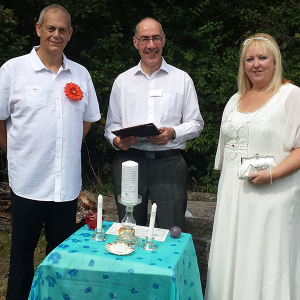
Civil Celebrant limitations
I am often asked what limits my availability, as regards location. Well, I can’t conduct a service in a C of E church, but that’s about it. Any other location – from hotels and restaurants to the Stonehenge inner circle, to a mountain top, a canalside, a back garden or underwater ( think creative!) – all these are technically available for wedding ceremonies.
Personal availablity
I live in Harrow, so I tend to work mostly in London, Herts. and Bucks., but I have conducted other ceremonies in Salisbury, Andover, Worthing , Epsom and the like. I guess that I haven’t been further afield because travel expenses inflate the fee. However, I was invited to conduct a wedding blessing in Ibiza last year – unfortunately, to my great regret, I had a clash of dates.
If you’re not planning to have your celebration in the South of England, don’t let it deter you from asking me for a quote. I’d love to help make your big day really special, wherever you choose. I can be surprisingly flexible!
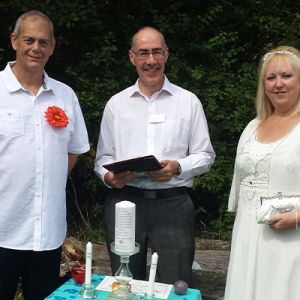
by Michael | Jun 23, 2015 | Blog
They say that you have to work at most things, but especially at marriage. If you doubt that, just look at the divorce rate. Many people believe that, once their marriage is ‘established’ – perhaps ten years old – there’s no more need to work at it.
Wrong!
Of course, you may have a freak marriage, where relationships are almost always smooth and harmonious, but reality tells us that that is almost never the case. There’s always something – whether it be stress from work, children, finances, health, annoying personal behavior or tics, other family members and so on. Any of these can put enormous pressure on a marriage.
If you are with me in acknowledging these risks to your relationship, what steps can you take to ensure that you remain a team?
Romance
One of the first things that go in a relationship is romance. Once you’ve hooked your spouse, you probably take your foot off the gas. Priorities change. You may well begin to take each other for granted.
To put that right, you may be able to make some sort of sacrifice for your partner, which may well give the right message that you still care.
The odd romantic gesture – be it flowers, a meal out or even a love message on a card – can make a real difference, and say “I do still value you”. Making time to share some fun moments together is invaluable, and leads nicely on to my next point.
Disputes
If there are areas of contention (and which relationship is without any?), then it is important to bring them out into the open, sooner rather than later, otherwise they may fester. Feelings then can run so deep that it may be impossible to save the relationship.
Mediation may be an option, whether via a relative or friend or professionally.
Humour
There are always going to be differences of opinion and mutual respect is essential here. Some issues will need to be worked out, but others can be resolved before they escalate. Humour is very often the catalyst for a happy solution, and far more likely to help than finger-pointing and accusations.
You can laugh at mistakes, make fun of yourselves – but the smiles and jokes should be affectionate, never aggressive.
Last-ditch attempts
Of course, if counselling does not work, rather than resort to divorce, a solution might be to try a period of separation. This can free partners from what might be the suffocation of too much time together – and they may begin to appreciate what the other brings to the relationship, when away from it.
Alternatively, separation can be less dramatic and merely take the form of doing pastimes or activities, or visiting friends, apart, on a regular basis.
Re-cement the Relationship
There are a lot of reasons to have a Vow Renewal ceremony.

For example, the vows you shared at your wedding may now be a distant memory; if your relationship has gone through a rocky time, why not declare to the world that you are well and truly together again; maybe you married abroad and friends or relatives never had a chance to be with you originally; you may want to declare your bond in front of children and even grandchildren. Either way, it is a beautiful ceremony that you can arrange just the way you want. A civil celebrant will be able to advise and guide you.
So be aware that a marriage is a very special relationship. Yes, it has to worked at (as do all relationships), but success is attainable and oh, so worthwhile!
Good luck with it – but remember that it is in your hands to make your own luck!
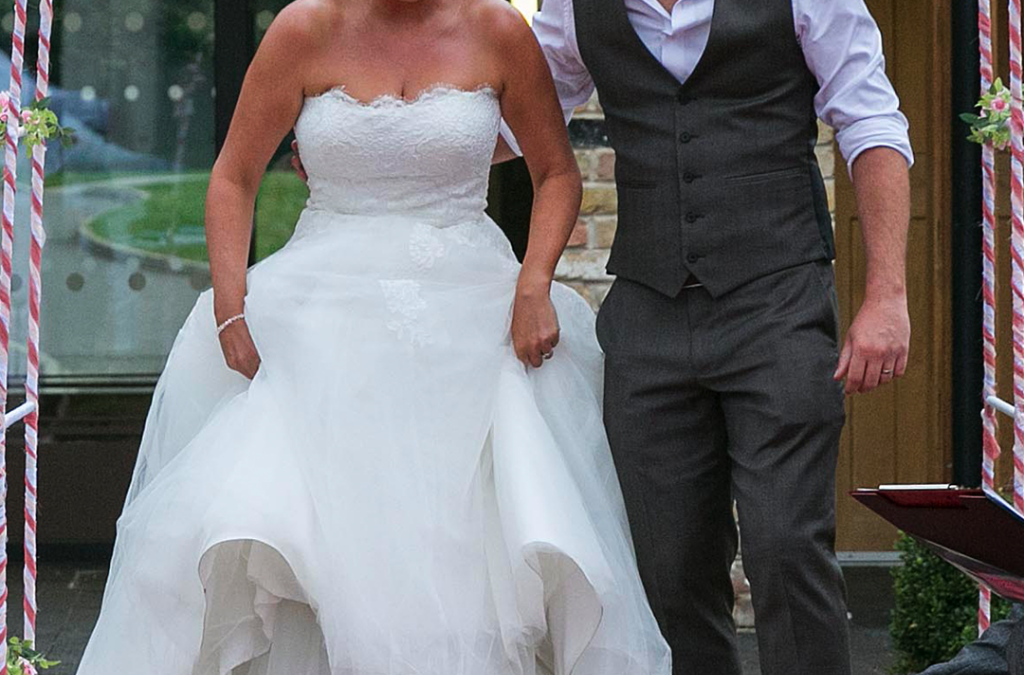
by Michael | Jun 9, 2015 | Blog
With times and trends moving so fast, it’s not always clear what wedding guests should and should not do nowadays. Here are a few rules to think about.
Invitations
Invitations may come by post or by e-mail these days, and it’s probably best to reply the same way. It is courtesy, to be frank, but it can also help the couple work out logistics, if all the replies come in the same form.
I don’t recommend giving an oral response (if you happen to meet the bride/groom out somewhere), as that can easily get overlooked.
It may be that only you are invited, but you have a plus-one. You may have to accept that the couple are limited for space/budget etc. And don’t assume your children are invited if they are not specifically mentioned. However, if you are engaged or married, then it’s fair enough to query it.
Social Media & photography
There will be differing views about photographing the wedding ceremony. (I have written on this subject before.) The first basic rule, in my view, is that unless you are actively encouraged by the couple (eg offering a hashtag to use on all wedding photos), don’t post anything. You certainly should not be posting before the couple themselves have done so.
There may well be a professional photographer present. He will have been paid specifically by the bride and groom to do a job, and it’s unfair if guests get in his way and even spoil shots for the couple.
Presents
There’s still a lot to be said about a John Lewis list or registry, for example. It makes perfect sense that the couple receive what they actually want – and not in multiple quantities. If the gifts on the list are too dear, then I’d say it’s acceptable to give a cheque or gift vouchers.
If you insist on giving an unasked-for present, then include the receipt so it can be changed, if necessary.
Dress
One thing that has become acceptable as a guest is to wear white to a wedding. But not all-white. Something with white in it is fine, but it’s really not the thing to steal the bride’s thunder. You can even wear black these days, but ensure it doesn’t look too funereal. (Jewellery and choice of shoes can lighten the effect.)
Ceremony and reception
Unless specifically stated otherwise, the invitation will be for the ceremony and reception (and not one or the other). You may not like church weddings, say, but that’s not an excuse to miss it. The couple will want you for the whole experience, so it would be rude to duck out. If it is important for the couple, it should be worth putting up with on your part.
Don’t think nobody will notice, either!
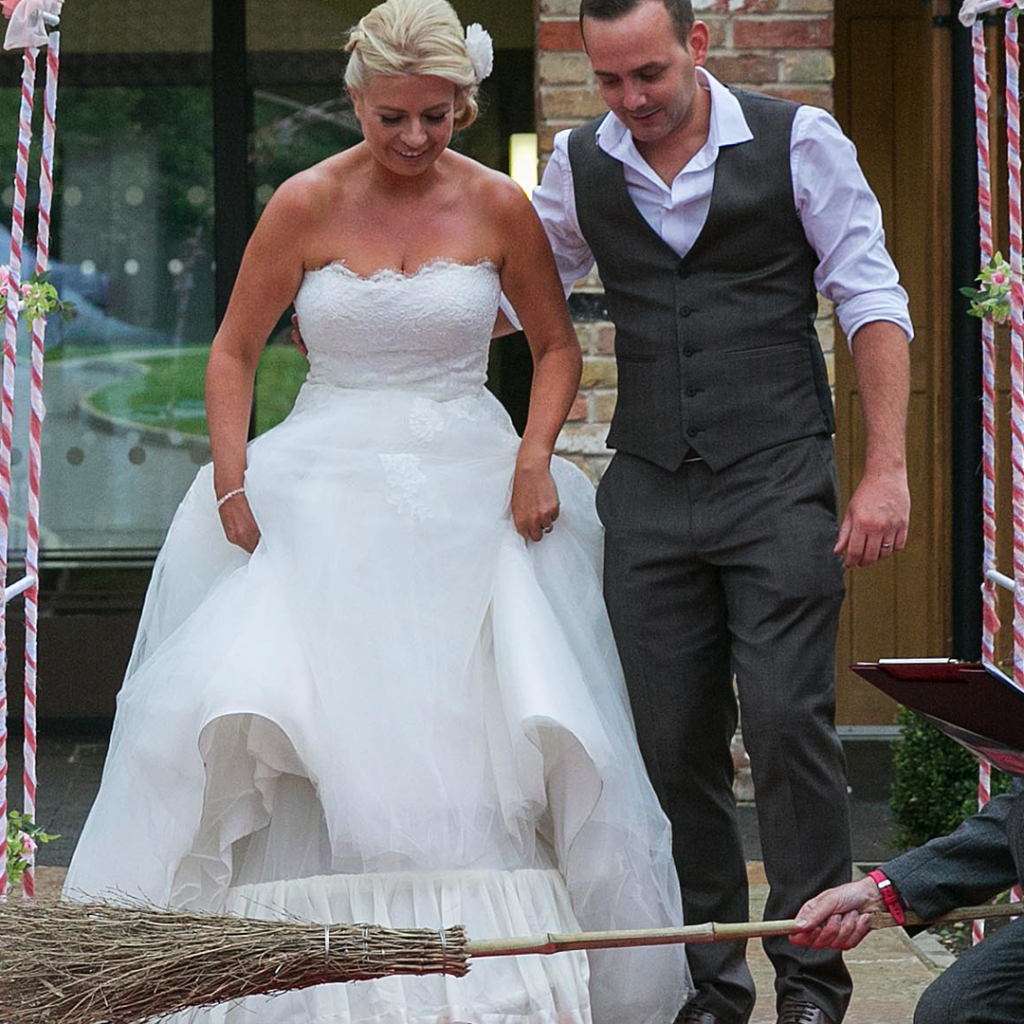
Participation
Whatever your views about wedding traditions, if the couple want to include some, respect this. It is their big day, after all, rather than yours. Excuse yourself quietly, if you really can’t stomach it.
Of course, if the wedding is civil celebrant-led, then don’t expect the orthodox, but have an open mind and enjoy!
There’s no reason why you can’t appreciate the wedding ceremony and reception as a guest. Most guests do so without the need to offend anybody. The key thing, whatever your feelings, is to remember whose day it really is.







